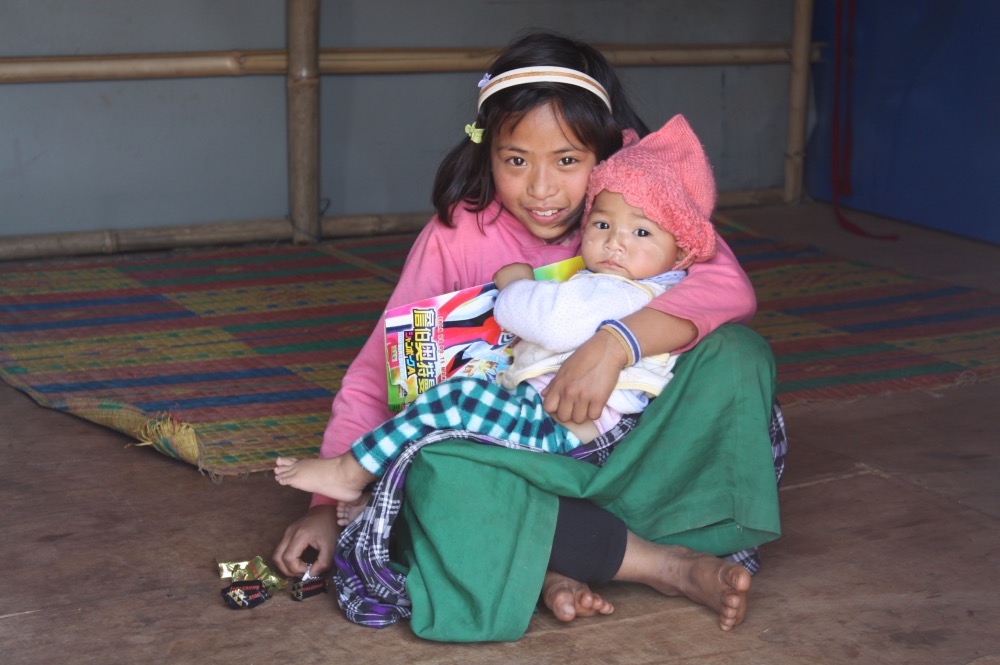
ELLIS HEASLEY, of UK-based religious freedom advocacy CSW, reflects on how recent events in Myanmar might impact minority groups in the country – and how you can respond…
On 1st February the international community watched in shock as the Myanmar army, known as the Tatmadaw, launched a coup against the democratically elected National League for Democracy, arresting the NLD’s leader Aung San Suu Kyi, along other political and civilian leaders across the country.
The Tatmadaw’s actions marked an unashamed assault on democracy, and a concerning step back in an already fragile democratisation process that they themselves had initiated in 2010. They claimed that the coup was in response to voter fraud during the country’s November, 2020, elections, during which the NLD won by an overwhelming majority despite ongoing concerns regarding severe human rights violations. However, a glance at the list of those arrested appears to indicate their true motives.

A displaced Kachin girl with her sibling. PICTURE: CSW
Activists, musicians, writers and filmmakers have been detained alongside NLD ministers in what amounts to a brazen attempt to silence all forms of dissent and criticism. Also arrested were at least three Buddhist monks Ashin Ariya Vansa Bivansa, known as ‘Myawaddy Sayadaw,’ Ashin Sobitha and Shwe Nya War – all of them known for their outspoken criticisms of growing Buddhist nationalism in Myanmar, and each surely targeted accordingly.
On 3rd February, it was reported that Ashin Sobitha had been sentenced to two years in prison, while Myawaddy Sayadaw has been disrobed as a monk and was expected to appear in court again on 9th February.
“The targeting of these Buddhist monks serves as an important reminder, and possibly an early-warning sign, of the potential plight of religious minorities now that the Tatmadaw have returned to direct power.”
The targeting of these Buddhist monks serves as an important reminder, and possibly an early-warning sign, of the potential plight of religious minorities now that the Tatmadaw have returned to direct power.
The Tatmadaw’s horrific violations of human rights against the predominantly Muslim Rohingya people has been particularly well-documented. After several decades of severe persecution, in 2016 and 2017 the military launched large-scale campaigns of violence against the Rohingya, the latter of which resulted in over 700,000 people fleeing to Bangladesh, thousands killed, and hundreds of villages burned.
Reported atrocities perpetrated against this ethnic group are among the most egregious the world has seen, including the burning of homes, schools and mosques, the deliberate burning of people to death inside their homes, mass rape, torture, execution without trial, and the blocking of aid. Several international observers, including the former UN Special Rapporteur for human rights in Myanmar, an Independent International Fact-Finding Mission established by the UN Human Rights Council, and the International Court Of Justice, have suggested that the violence against the Rohingya amounts to genocide.
There are now genuine concerns that the Tatmadaw may intensify its campaign against the Rohingya once again. On 2nd February the United States Commission on International Religious Freedom (USCIRF) issued a statement in which the commission’s vice-chair, Anurima Bhargava, warned: “Given the history of brutal atrocities by the Burmese military, our fear is that violence could quickly escalate, especially towards religious and ethnic communities, such as the Rohingya and other Muslims.”
It is important to remember that the Tatmadaw are also responsible for severe violations against other ethnic minorities in Myanmar. In the north of the country, particularly in Kachin and northern Shan states, the Tatmadaw’s violence against the majority Christian Kachin and Chin ethnic groups has led to thousands of civilian deaths, and the displacement of over 120,000 people. These too have been deemed to amount to atrocity crimes – specifically war crimes and crimes against humanity.
While these conflicts were ongoing during much of Myanmar’s slow democratisation process, there are fears that they may escalate as the country cuts itself off from the wider international community, and by extension from the already limited leverage international actors had to hold the Tatmadaw to account.
That isn’t to say that the international community are unable to do anything. Today it appears that the lifting of international sanctions as Myanmar set out on its path of democratisation was done too hastily. Now that the Tatmadaw has shown its true colours, it is essential that the international community respond with targeted sanctions on Myanmar’s generals and military leaders.
We too can play our part. As Christians, we can lift the nation of Myanmar in our prayers – this is not a passive action, but rather a powerful and essential response to a time of crisis. On CSW’s Burma prayer page is a list of specific issues to bring before God – including the immediate and unconditional release of Aung San Suu Kyi and all the others who have been arrested, and the safety of all the citizens of Myanmar in these uncertain times.
Those of us fortunate enough to live in democratic states can also call on our own leaders to act. In Australia, you can write to your elected representative and ask them to encourage the Department of Foreign Affairs and Trade (DFAT) to raise these issues with Myanmar at every opportunity. Similar avenues exist in Canada, the EU, Japan, the United Kingdom, the United States, and elsewhere. Wherever you live, now is the time to stand in solidarity with the people of Myanmar and demand that this coup is not allowed to stand.
Ellis Heasley is public affairs officer at CSW.





